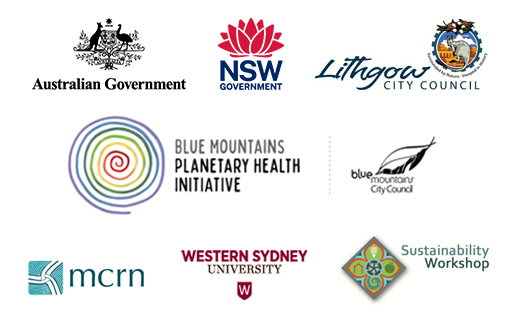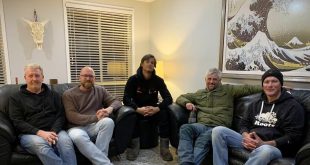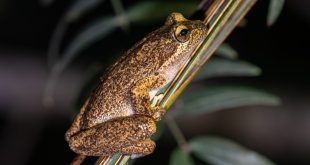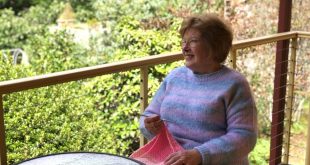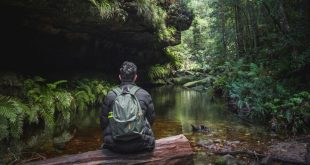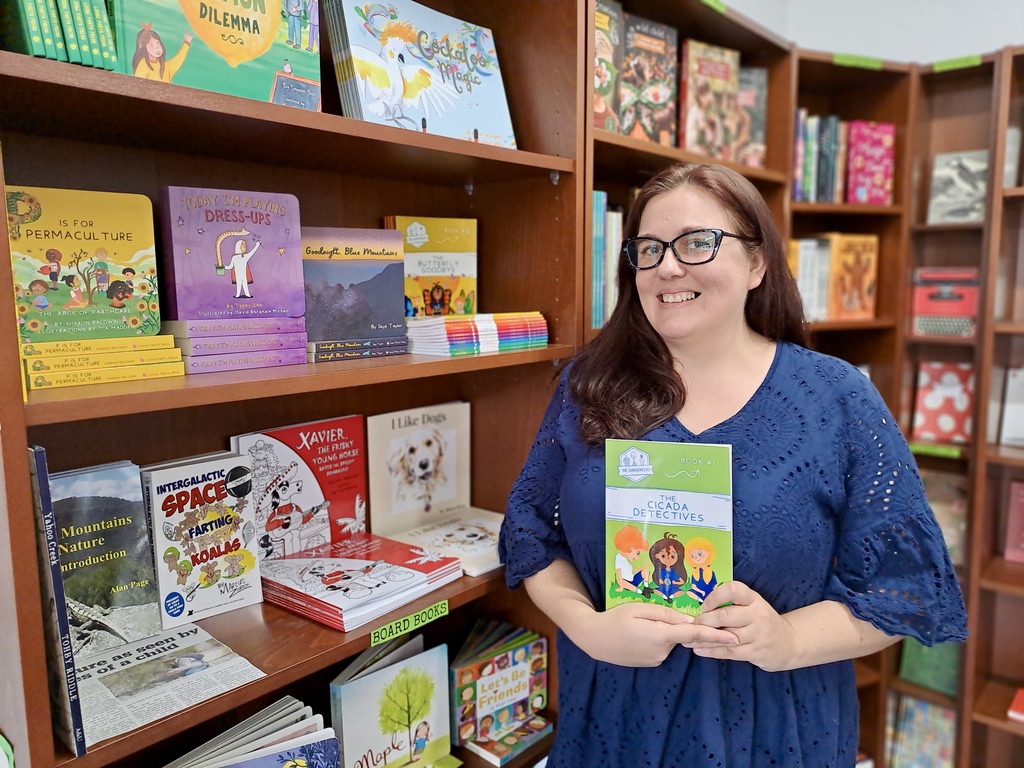
Sharon with her collection of Loose Parts Press books at the Good Earth Bookshop in Wentworth Falls
Story and photographs by Belle Butler
Lawson writer and publisher Sharon Baldwin has written a series of children’s books based on the unique subject matter of permaculture. The Gardeneers is a 12-book series for ages 7-10, each story focussing on a different permaculture principle. She has also published a board-book called P is for Permaculture. It’s aimed at preschool-ages, using the alphabet to introduce permaculture concepts. Sharon’s publishing company Loose Parts Press publishes books about nature, sustainability, the environment, social justice, and creativity.
We had a coffee and chatted about her work.
What inspired you to write stories about permaculture for children?
I was inspired to write these stories after doing an Introduction to Permaculture course at Lyttleton Stores. I was really excited about all the new things that I was learning. I was talking to my kids about it, and I wanted to see if there were some more resources I could use to help explain these permaculture principles. I couldn’t find a whole lot. I started coming up with examples of how it might relate to their garden at school. That’s what gave me the idea.
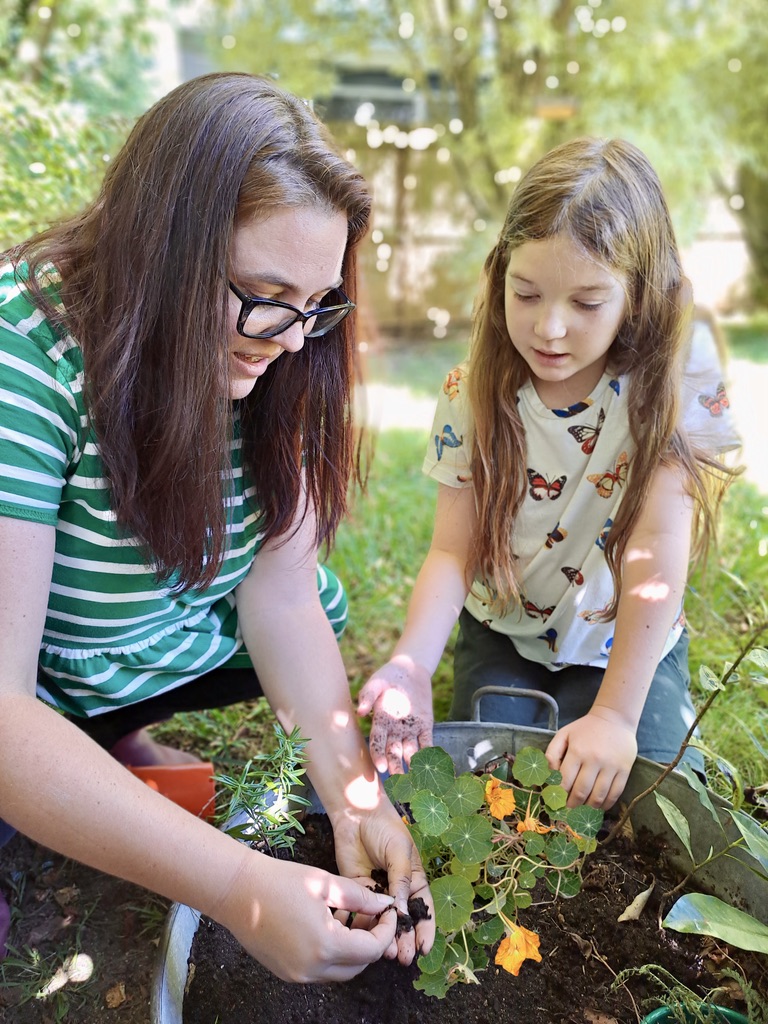
Sharon with her daughter Luella finding worms in the garden
Why do you think it’s important to raise awareness about permaculture?
It’s this framework of principles that you can apply both in and out of the garden. For example, one of the principles is about valuing diversity, which in the context of your garden is talking about biodiversity of the soil and planting a variety of different vegetables instead of a monoculture crop, like a big field of rows and rows of corn or something. But obviously diversity has really important applications outside of the garden as well. So my story on diversity talks about trying new foods from different cultures.
What I also really like about permaculture is that it’s this holistic approach to caring for land. It’s really big picture and it’s focussed on all of the different things that are part of the ecosystem. So, in addition to the earth care side of it, there’s people-care. The other pillar is fair-share, which is a concept that if you are growing food, then make sure you are growing food for everyone.
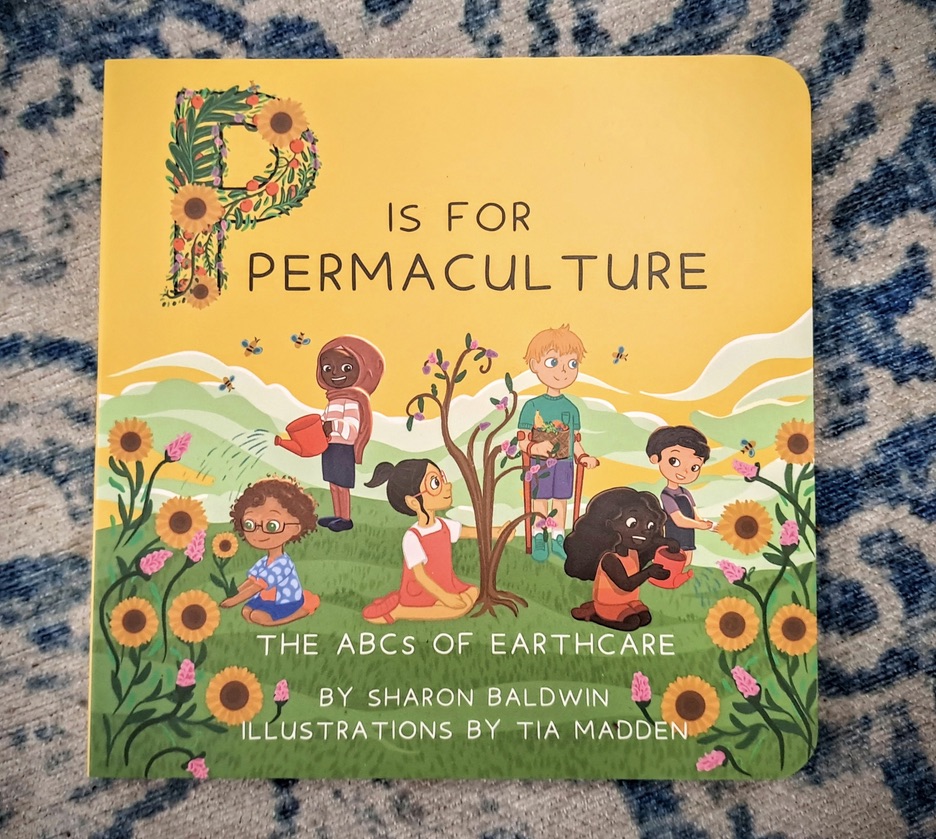
Sharon’s first book, ‘P Is For Permaculture’ explains permaculture principles to preschool aged kids.
What piqued this interest in permaculture for you?
I think because I started looking into disaster preparedness and prepping for end of the world type-of-stuff, and a lot of that is very individually focussed. It’s about, you know, making your own little bunker underground and storing all your guns and your food in there. I like that permaculture recognises that the only way we’re going to survive whatever happens with climate change is by working together.
So, was it that sense of looming disaster that prompted you to take part in the course?
Yeah, for sure. It was also moving up to the Mountains and having my own yard for the first time. We moved to Lawson in 2020 in the middle of the pandemic. There were these stories in the news about people buying up all the toilet paper and hoarding it. Permaculture was very much an alternative to that mindset. Whether it’s climate change-related or pandemic, facing income loss or loss of jobs, we have to live a bit more simply.
Did it succeed in making you feel more prepared?
I’d say it made me feel more capable of doing things. I mean, I grew up very much a city girl and had never grown a vegetable before. I wanted to show myself, hey, I can do this, I can get into the dirt and do all of these things and feel a bit more like a competent human being. I also wanted to impart these skills that I didn’t grow up with to my kids.
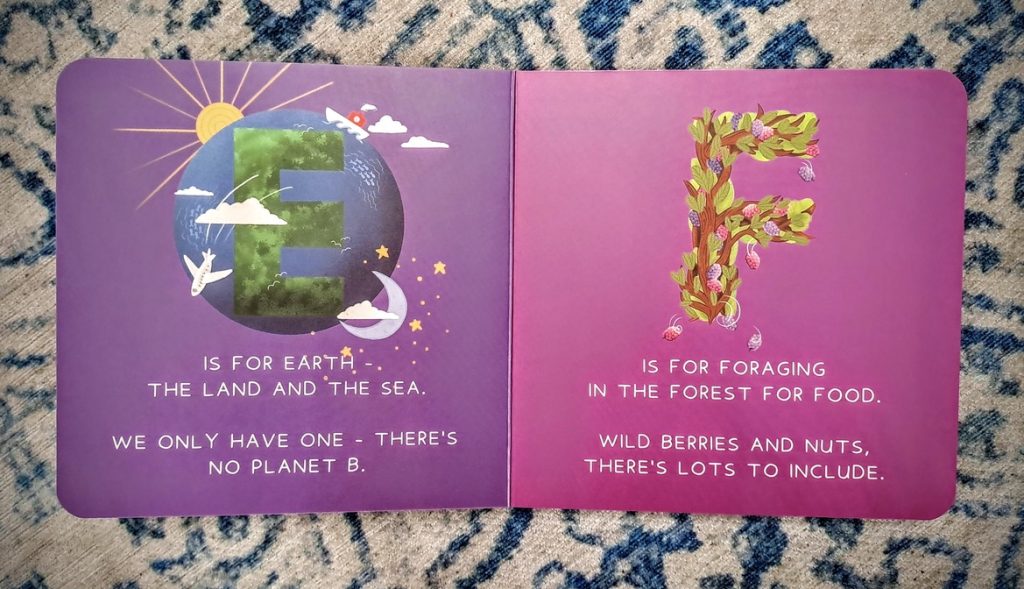
The letter ‘E’ is particularly poignant in Sharon’s board book ‘P Is For Permaculture’
What do you hope kids and parents take away from reading your books?
I guess what I hope people take away is that there’s so much to learn from growing fruit and vegetables, beyond the tangible benefit of having food to eat. There’s a lot of discipline involved in growing and tending to a garden. There’s lots to learn about cooking food and sharing food.
Ideally, I’d also love to get the books into more schools and classrooms and have them used alongside the curriculum. When you’re talking about food you can talk about different cultures and different parts of the world. There’s also so much science involved in it. So there are lots of different connections to be made.
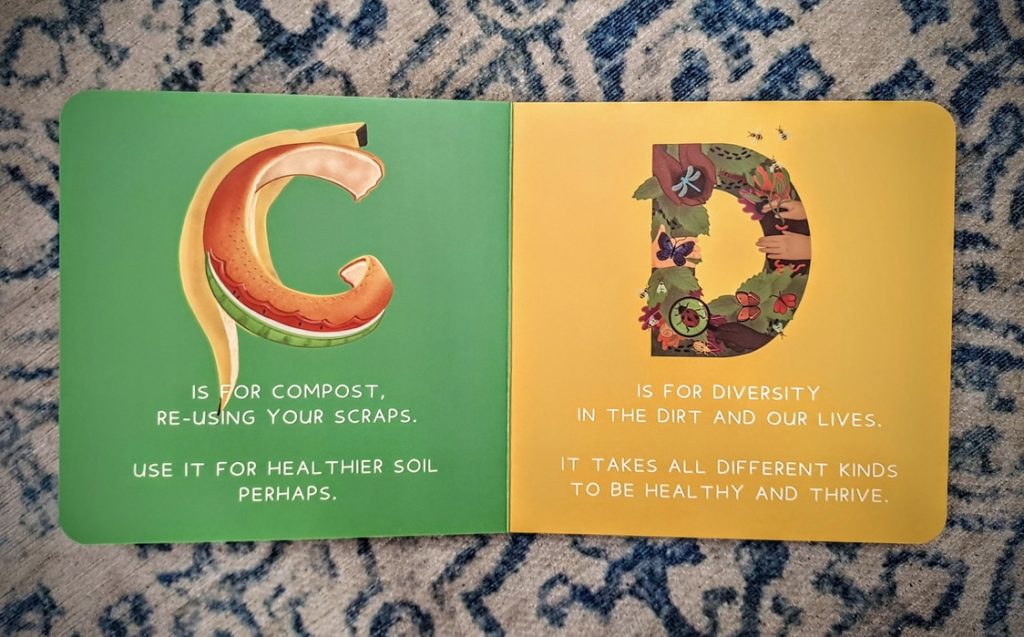
Following the alphabet in P Is For Permaculture
I understand that you self-published these books. Can you tell me why?
Publishing, as you know, is a very competitive industry. I had conceived of these books as a complete 12-book series. It was a really hard concept to pitch to a publisher as a first-time author, so I realised that self-publishing was probably the only way I was going to get this off the ground. I ran a Kickstarter to get the project launched and I was able to move a lot faster than if I’d gone down the traditional publishing route.
What made you then decide to start your own publishing company?
I really enjoyed the process of designing and publishing books. I was learning so much about the industry that I really wanted to continue with that. I was lucky that I had a lot of creative friends, one of whom approached me about publishing her picture book, and it really just grew from there. We just published our sixth book in addition to the 12-book series.
I’d love to make my publishing company as sustainable as possible, but there are a lot of challenges within the industry in terms of production. The Gardeneers books are all published in Australia – I used a certified B Corp publishing company called lulu.com to print those. Unfortunately, there’s no Australian board-book printers, so I have to go overseas for those. I don’t like adding to that carbon footprint of shipping around the world, but at the moment it’s the only option. I’ve had some ideas around creating a printing cooperative, so that we can get board books printed domestically. That’s one of those long term goals. I do pay for carbon offsets to try and combat the shipping footprint. But there are definitely some changes within the publishing industry that I’d like to see, both in terms of sustainability and the human rights issues that also come with overseas printing.
Your publishing company is called Loose Parts Press. Is there a reason why you chose that name?
‘Loose parts’ comes from the early childhood education world. Instead of giving kids toys that light up and make noises, you just give them really basic things like wooden blocks and buttons and pinecones etc. The idea is that it leaves a lot more room for imagination and for them to come up with their own creative ideas. Before I was a publisher I ran playgroups, and that was something we incorporated. I really liked the concept. The idea of loose parts also resonates with me because I’ve always got a lot of projects up in the air, a lot of different ideas floating around in my brain. Sometimes I feel like my brain is just a jumble of loose parts!
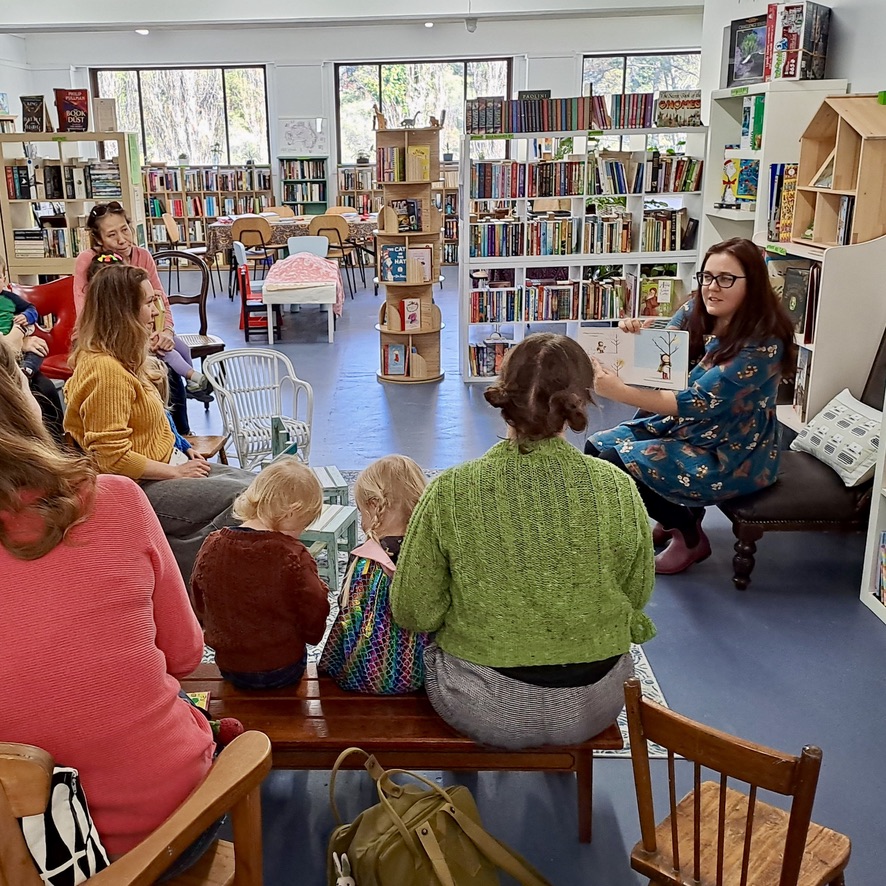
Sharon reading to an engaged crowd at Storytime at the Good Earth Bookshop
Do you have any up-and-coming books that you’re excited about?
Yes, yes I do! We just released another book called The Leftover Lemon Dilemma. It’s a beautifully written story about community and a little girl whose abundance of lemons leads her and her neighbours to create a neighbourhood crop swap. So, it touches on a lot of different values that are important to me as a person and as a publisher.
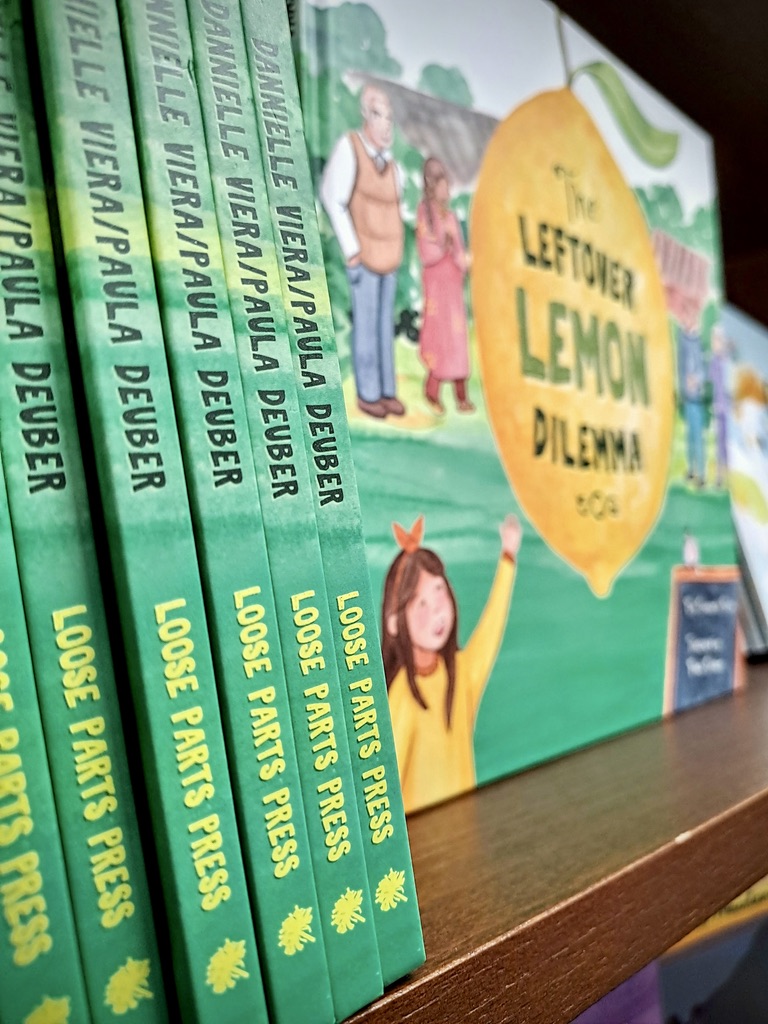
Loose Parts Press’ latest publication: ‘The Leftover Lemon Dilemma’
Related stories:
Connect at Home: Books that Open your Heart to Country
Talk of the Town: Good Earth Bookshop
This story has been produced as part of a Bioregional Collaboration for Planetary Health and is supported by the Disaster Risk Reduction Fund (DRRF). The DRRF is jointly funded by the Australian and New South Wales governments.
